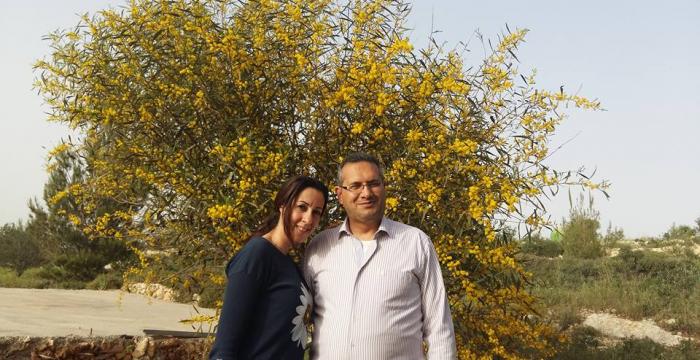
100 Years of Fortitude – Nassar Farm celebrates its centennial anniversary
The image: Anton and Nisreen Nassar at their family farm in the Bethlehem municipality
Most of those who are familiar with the struggles of Palestinians in the West Bank have heard of Nassar Farm and the family’s ongoing legal battle to retain hold of their land, for which they hold a 100 year-old property title—but what many may not know is the farm’s connection to Bethlehem Bible College.
Anton (“Tony”), the youngest of the nine Nassar brothers and sisters, is a graduate of BBC. The college is where he met his wife, Nisreen, who today serves as President Jack Sara’s personal assistant, while Tony is the principal of the local Evangelical Lutheran School. Nisreen herself was dedicated to Lord as a baby by Bishara Awad, founder of BBC. In a land where the Christian community—especially the Evangelical community—is so small, it is not surprising that “everybody” knows each other and their lives overlap.
Recently the farm celebrated its 100 year anniversary and people came from all over the world to celebrate and stand in solidarity with the Nassars; camping on the land, holding workshops and playing music—a celebration that family patriarch Bishara Nassar would have no doubt loved, being himself a musician. His vision for his family’s land was instilled in his children: that the land would become a “tent of nations” in which all were welcome to share in the joy and bounty of living close to the earth.
Tony remembers fondly his childhood on the land, sleeping in the natural caves that dot the property, planting trees, bringing in the harvest of olives, grapes, almonds, wheat and other crops.
“We celebrate the fact that God has kept us through the years. It has not been an easy time,” says Tony. “The years have been full of suffering, especially since 1991, when our property was declared state land by Israel.”
Nonviolent Standoff
It was while he was a young man studying theology at BBC that tensions rose to a peak between his family and the Israelis who live in the growing settlements that encircle their property. In 2002, while in classes at BBC, Tony got an emergency call from his family: A large group of settlers were on the family property—and they were armed with guns, dogs and a bulldozer. They were claiming the farm as their own and attempting to dig a road through the middle of it. Tony left class to join his family and was joined by Bishara and Alex Awad, who was at that time a professor at BBC, as well as Jonathan Kuttab, a human rights lawyer.
On the property, the small group stood in a circle and prayed. “The settlers had guns, but we had no protection except the Lord. What else could we do?” As they prayed and read their Bibles, the bulldozer and another earth-moving vehicle began to move in closer. The group adjusted itself in front of the bulldozer in non-violent resistance. Over an hour passed. Jonathan Kuttab was knocked to the ground. Eventually, about 60 Israeli soldiers came out to the property, facing the settlers with bullhorns and telling them to go home.
The settlers were undeterred. They yelled back at the soldiers, “This our land! You cannot make us leave!”
After arguing for over an hour, the IDF finally forced the settlers to leave, which the Nassar family considered to be a miracle. “We think it is because of all the international pressure at that time” says Tony. “Usually these events are the other way around and the Palestinians are the ones who have to leave!” But later that day the settlers returned to the property and uprooted about 250 newly planted olive saplings and broke the water tanks that the Nassars used to collect rainwater. “We were frightened! They held guns to our heads!”
Three weeks later, the Nassar family planted new trees with the support of the UK solidarity group Jews for Justice for Palestine.
For the Sake of the Trees
It was not the last time that settlers would uproot trees. Early one May morning in 2014, just as the fruit was a week or two from harvest time, Israeli bulldozers destroyed hundreds apricot trees. Ever determined, the Nassars rebuilt the terraces, and with help from many international volunteers, planted 4,000 trees in their place.
On the issue of the trees the Nassar family is firm, quoting from Deuteronomy. “It is not biblical to uproot and destroy trees as the Israelis are doing. Even in a time of war, it is not permissible!”
“When you besiege a city for a long time, making war against it in order to take it, you shall not destroy its trees by wielding an axe against them. You may eat from them, but you shall not cut them down. Are the trees in the field human, that they should be besieged by you?” (Deuteronomy 20:19)
While the family is forbidden under Israeli law to build anything on their property, they have found creative ways to remain on it. Though not allowed to have running water or electricity—and in spite of numerous demolition and ‘stop cultivation’ orders—they continue to envision a better time when they will be allowed to develop their property as they please. “Our family wants to establish a school on the farm someday; one that will focus on sustainability, organic farming and recycling.”
Precious Family Treasures
Tony and Nisreen are raising their four children—Lubna, Natalie, Bishara, and Layal—to be strong Christians who are proud of their family heritage and connection to the land. The family is very active in the Lutheran church and in the larger Christian community. And indeed, on the farm’s centennial celebration, five Nassar children played in the Brass for Peace; the notes of “Pomp and Circumstance” sounding out over the valley, directly across from Israeli settlement Navii Daniel. Young Bishara Daoud bravely addressed the large crowd with a few of his cousins, while little Layal scampered around the property, playing with the puppies and visiting children, as a German band played “Take Me Home, Country Roads,” (one of Daoud Nassar’s favorite songs).
During the busy event, Tony and Nisreen sat quietly together under the shade of a large tree, watching the Palestinian dabke dancers leap high in the air. “I was only 4 years old when my father died, but my family lives to honor his legacy” says Tony.
“The Israelis want to cut off our belonging to this land, but they can never do so. Jesus came that we might have life, and that more abundantly. We want this land to have life for the next generation, for our children.
“We will not retaliate with violence, but we will resist by using this land to help our people! We have a saying: ‘on this land, we deserve to live.’”
In this, the land is only an outward picture of the true inheritance of the Nassar family legacy: steadfast patience given as an heirloom from one generation to the next; faith, hope and love passed on as the costliest family treasures, under which canopy the fruitful olive trees—like the Nassar children and grandchildren—find their deepest and truest roots.
As Tony says, “The Tent of Nations will continue on the path for justice with faith, love and hope until we see the sun of justice rising again. We welcome you to come, see and be part of what we are doing. Together, we can make a difference.”
You can learn more about Tent of Nations at their website: http://www.tentofnations.org/

